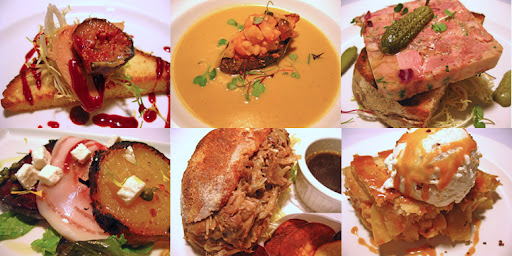Six Questions About Being A Professional Chef
A listener by the name of Stephen wrote me the other day with 6 questions about becoming a professional cook. Instead of writing him back directly, I figured the best way to answer his questions were in the form of a blog post so other readers could benefit as well. So here they are, 6 questions about becoming a professional cook.
What is the best part of the work?
For me, there are many things that I love about working in a professional kitchen, but if I had to choose only one, I would have to say pursuing food knowledge. I find food absolutely fascinating; how the slightest change in flavor, texture, and seasoning can be the difference between an OK dish and some of the best food ever. I also like the instant gratification you get when a customer absolutely loves your dish; I've never been a rock star, but when someone raves about my food, I sometimes feel like I am. ![]()
Also, your tasks in a professional kitchen are very structured and defined. You have set goals for prep, execution, plating, etc., on a daily basis. It gives your work an intense focus without abstractions; either you can get the job done properly or you can't. I've always found that working towards defined goals and achieving them is one of the best personal motivators in the world. In a kitchen, you get to do this on a daily basis.
What is the worst part of the work?
Although every profession has its own set of irritants, I hesitate to label anything the “worst” part of my job because there are things that I knowingly accepted as part of the struggle to achieve my culinary goals. I find that when people, especially in restaurants, label something as "the worst part of my day" or
"the worst part of my job" that they are instantly admitting defeat and letting that "worst thing" take over valuable time and effort, as well as their mental and physical energy.
Some things that will sometimes make my job more difficult are:
Spending nights and weekends away from my wife and child. Although she is extremely supportive, and she knew exactly what she was signing up for when we got married, I sometimes feel guilty that we can't have nights and weekends off together like most other married couples. However, when we do have time off together, it just makes it that much more special.
Not being able to spend Christmas and Thanksgiving with my family. I have a large extended family that I love deeply. The two days a year where almost everyone gets together are Christmas and Thanksgiving; because of the restaurant I have chosen to work for, I can no longer make these family gatherings.
How much money does a good cook expect to make?
It depends on where you work and who you work for. In the culinary industry, there is actually a reversal of salaries; the better the restaurant, the lower the pay. This is because truly passionate cooks are willing to sacrifice the lower pay to be able to put that great restaurant on their resume, and more importantly, take with them the techniques that restaurant offers to teach them. The industry average for line cook pay will range anywhere from just over $19,000 (on the low side) to $25,000 (on the high side). Hotels, union restaurants and corporate chain restaurants are known to pay more money and provide benefits, but don't expect them to teach you the newest and greatest techniques. Really, they just want you to show up and work your station. There is an old rallying cry among cooks in professional kitchens: "We came for the long hours, and stayed for the low pay." Being a cook isn't about money, it's about passion.
What would you tell someone who is wanting to become a cook?
If you’re just starting out, I have three keys to your success to being a line cook: (1) Passion, (2) Humility, and (3) Knowledge.
Passion. This is what is going to make all the sacrifice, low pay, and long hours worth it. You have to have a defined, passionate goal; something you want to work towards. And you need to have passion about food and someday being a professional chef. Without true passion, you will never succeed in a restaurant kitchen.
Humility. It doesn't matter how much you know about cooking or even being a line cook, you always have to be humble and be willing to learn new things. You can never be "too good" to clean floors, peel vegetables, and/or make stock. In fact, some of my fondest memories are when I first started out as a prep cook. They were simpler times with a world of possibilities at my feet. Enjoy it while it lasts.
Knowledge. If you want to be a professional cook/chef, you can never stop learning and you must have a burning desire to learn more about food and the inner workings of a restaurant kitchen. Read anything and everything you can get your hands on, and work for the best chef who will let you step foot in their kitchen, even if you have to start out by working for free. The sacrifice and investment in time will pay huge dividends in the long run.
What is better in your opinion, morning shifts working breakfast and lunch, lunch and dinner shifts, or dinner only restaurants?
This is a personal preference more than a "what is better." For me, I'm passionate about fine dining, so I prefer to work in a “dinner only” establishment because it allows me the time and focus I need to put out the best food possible. There is nothing wrong with being a breakfast or lunch cook, but each position requires different talents, passions, and goals. It's basically the difference between being a monster truck mechanic or a sports car mechanic; both have to have the same fundamental knowledge and skills, but their passion is what ultimately directs them in one direction or the other.
How do you decide in what type of restaurant you want to work?
For me, when I first started out, I decided that I wanted to work exclusively in fine dining because it opened up the most possibilities. It's really hard for someone who works at a mid-level bistro to make the jump to fine dining because most high level restaurants require years of experience before they even give you a call back on your resume. Starting out, I would recommend working for the best restaurant that you possibly can, and see where your passion leads you. It's much easier to go from fine dinning to rustic bistro than the other way around.

